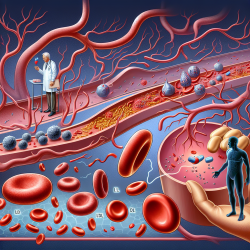Introduction
In the realm of speech-language pathology, the focus is often on enhancing communication and cognitive skills in children. However, the broader context of child health and safety cannot be overlooked. A recent comprehensive review titled Managing Terrorism or Accidental Nuclear Errors, Preparing for Iodine-131 Emergencies: A Comprehensive Review provides critical insights into emergency preparedness that can indirectly impact child health outcomes.
Key Findings and Recommendations
The research underscores the importance of potassium iodide (KI) in mitigating the risks associated with iodine-131 exposure, a byproduct of nuclear accidents. The study highlights several recommendations that can be pivotal for practitioners, especially those working in schools and with children:
- Pre-distribution of KI: Ensuring that at-risk populations, particularly children, have access to KI before a nuclear incident occurs. This can significantly reduce the risk of thyroid cancer.
- Prompt Administration: KI should be administered within two hours of exposure to be most effective, reducing thyroid uptake of radioactive iodine by up to 99%.
- Educational Initiatives: Educating the public, especially parents and educators, about the sources of dietary iodine and the importance of iodine sufficiency in preventing radiation-induced thyroid issues.
- Global Health Programs: Supporting global initiatives to address iodine deficiency, which affects approximately two billion people worldwide, thereby reducing the vulnerability to iodine-131 exposure.
Implications for Practitioners
For practitioners in speech-language pathology, these findings emphasize the need to advocate for comprehensive health and safety measures in schools. By understanding the broader health risks and preparedness strategies, practitioners can better support the holistic well-being of children. This includes:
- Collaborating with school administrators to ensure emergency preparedness plans include KI distribution and administration protocols.
- Participating in community education efforts to raise awareness about the importance of iodine sufficiency and emergency preparedness.
- Encouraging further research into the impacts of iodine deficiency on cognitive and communicative development in children.
Conclusion
The comprehensive review provides a data-driven foundation for improving emergency preparedness related to iodine-131 exposure. By implementing these recommendations, practitioners can play a crucial role in safeguarding the health and cognitive development of children in the face of potential nuclear incidents.
To read the original research paper, please follow this link: Managing Terrorism or Accidental Nuclear Errors, Preparing for Iodine-131 Emergencies: A Comprehensive Review.










